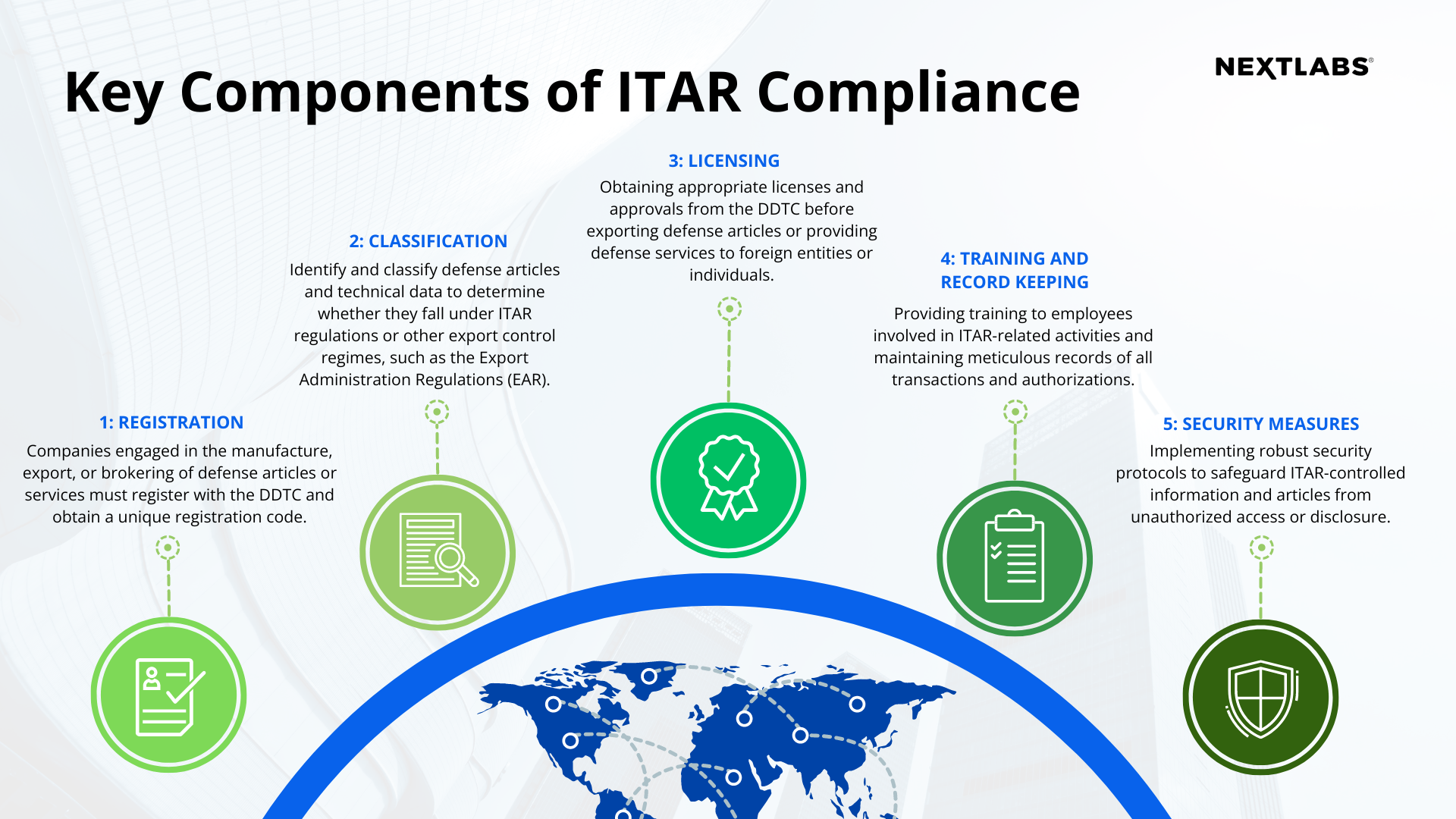Home | Solutions | Regulatory Compliance | ITAR Compliance 101: Key Regulations & Best Practices
In today’s interconnected world, businesses engaged in international trade must adeptly navigate a complex web of regulations to ensure seamless adherence to export control laws. While this might appear to be an imposing task, a comprehensive understanding and implementation of ITAR Compliance can yield multifaceted benefits that go beyond mere legal requirements.
What is ITAR Compliance?
ITAR Compliance refers to the adherence to the regulations outlined in the International Traffic in Arms Regulations (ITAR), a crucial framework governing the export and transfer of defense-related articles, services, and technical data. Managed by the U.S. Department of State, ITAR plays a pivotal role in safeguarding national security interests and preventing unauthorized dissemination of sensitive defence technologies and weaponry to foreign entities or individuals. Under ITAR, defence articles are categorized under the U.S. Munitions List (USML), encompassing a wide array of items vital for military or strategic purposes. To ensure proper handling and control, businesses engaged in manufacturing, exporting, or brokering such items must comply with ITAR’s stringent guidelines, including obtaining licenses and approvals from the Directorate of Defence Trade Controls (DDTC). This compliance ensures that defence-related information and technologies remain protected and in line with U.S. national security objectives, reinforcing the integrity of international trade within the defence industry.
Key Components of ITAR Compliance

ITAR Compliance involves essential elements that businesses must address to ensure strict adherence to the International Traffic in Arms Regulations. Starting with the identification of controlled items and technologies under ITAR is paramount. This step requires a meticulous examination of the USML to determine if the products or technologies being dealt with fall within its purview.
Next, it is important to provide comprehensive compliance training to employees to cultivate a culture of awareness and responsibility within the organization. Training should cover the intricacies of ITAR regulations, potential risks of non-compliance, and guidelines for handling sensitive information and controlled items. By having a clear understanding of these key components, businesses can fortify their ITAR compliance measures and effectively navigate the complexities of international trade in defence-related goods and services.
Legal & Security Implications
Non-compliance with ITAR regulations can lead to severe penalties, both in terms of financial repercussions and legal consequences. Such penalties may include hefty fines, loss of export privileges, and potential criminal charges for individuals involved in wilful violations. In separate high-profile cases, Airbus and Honeywell faced significant penalties for violating ITAR regulations. In 2020, Airbus agreed to pay over $3.9 billion in global penalties after being involved in a scheme involving violations of the Arms Export Control Act and ITAR in the United States. In 2021, Honeywell reached a $13 million settlement with the US Department of State for alleged ITAR violations. These cases highlight the severe consequences companies may face if found in violation of such laws.
As previously mentioned, ITAR plays a vital role in safeguarding national security interests. By controlling the export and transfer of sensitive defense articles and technical data, ITAR helps prevent the proliferation of critical technologies to unauthorized entities or nations. This export control mechanism reinforces the integrity of national security, emphasizing the legal and security implications of ITAR compliance and underscores the responsibility of businesses to uphold these regulations and contribute to a secure international environment.
Challenges Faced by Businesses
Achieving ITAR compliance requires a deep understanding of complex regulations and requirements. The intricacies of ITAR can be daunting, particularly for companies dealing with defence-related items and technologies. The process of identifying controlled items on the USML and obtaining the necessary licenses and approvals from the DDTC can be time-consuming and resource intensive. Moreover, compliance efforts can be further amplified for small and medium-sized enterprises (SMEs) with limited resources and expertise. Coping with ITAR compliance requires strategic planning, dedicated compliance officers, and robust internal controls to ensure that all aspects of the regulations are adhered to diligently. Despite the challenges, businesses can adopt practical approaches, such as seeking expert guidance, investing in training programs, and leveraging technology solutions, to streamline their compliance efforts and navigate the complexities of ITAR regulations effectively.
Benefits of ITAR Compliance
Despite its challenges, ITAR compliance brings with it a host of valuable benefits for businesses operating in the defence industry. Firstly, being ITAR compliant opens doors to government contracts and restricted markets, providing companies with lucrative opportunities to supply defence-related goods and services to the U.S. government and its agencies. This access can significantly boost a company’s revenue and market presence.
Moreover, ITAR compliance enhances a business’s reputation and credibility in the global marketplace. Demonstrating strict adherence to ITAR regulations signals to customers, partners, and stakeholders that the company is committed to responsible business practices and upholding international trade laws. This elevated credibility can foster trust and attract more business collaborations, thereby solidifying the company’s position as a trusted and reliable player in the competitive defense industry.
ITAR Compliance Best Practices
Developing an effective compliance program is essential to ensure seamless adherence to ITAR regulations. This involves appointing a dedicated compliance officer or team to oversee compliance efforts, conducting regular training sessions for employees to raise awareness about ITAR requirements, and implementing clear policies and procedures that align with the specific needs of the organization.
Additionally, robust recordkeeping practices are critical for documenting all ITAR-related activities. Conducting internal audits and assessments is another best practice that enables companies to proactively identify compliance gaps and potential violations. Regular audits help evaluate the effectiveness of the compliance program, allowing businesses to take corrective actions promptly and maintain a strong compliance posture.
Looking Ahead: Future Trends in ITAR Compliance
The landscape of ITAR compliance is continually evolving, and businesses must stay vigilant about potential changes to regulations. As security threats and global dynamics change, ITAR regulations may undergo updates and revisions. Companies need to stay informed about these changes and proactively adapt their compliance measures to remain in compliance. Embracing emerging technologies and solutions can be advantageous in streamlining compliance efforts. Investing in advanced IT systems for better tracking, reporting, and managing ITAR-related activities can boost efficiency and accuracy. Partnering with compliance experts can also provide valuable guidance in navigating the complexities of ITAR regulations. Moreover, nurturing a proactive compliance culture within the organization is essential to staying ahead of compliance challenges. By being agile and well-prepared, businesses can position themselves to capitalize on new opportunities in the defence industry while maintaining the highest standards of compliance.
How NextLabs Ensure ITAR Compliance
NextLabs offers comprehensive solutions that aid in enforcing policies for access control and streamline auditing processes to facilitate ITAR compliance. NextLabs’ zero trust data security suite enables organizations to achieve:
- End-to-end export control for physical goods, digital goods, and technical data
- Best-practice policy enforcement for technical data, including data classification, access control, data sharing, data storage, data transmission, data handling and use, and data mobility
- Blocking of unauthorized exports of goods and technical data
- Centralized logging of all exports of technical data
With NextLabs, companies can streamline the compliance process, simplify audits, and proactively address potential compliance gaps. This results in an enhanced compliance posture, making audits more manageable while upholding data protection and national security standards.
Learn more about how NextLabs can streamline your organization’s journey to achieve export control compliance in our “What are Export Controls?” article.





